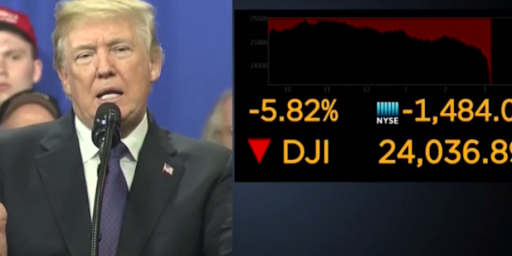Standard & Poor’s Lowers U.S. Public Debt Outlook To “Negative”
A new report from one of the world’s top credit rating agencies is sending waves through the stock markets:
NEW YORK (CNNMoney) — Standard & Poor’s lowered its outlook for the nation’s long-term debt Monday, even as it reaffirmed the agency’s top-tier rating for the U.S. economy.
S&P maintained its ‘AAA/A-1+’ credit rating on U.S. sovereign debt, saying the nation’s “highly diversified” economy and “effective monetary policies” have helped support growth.
But the ratings agency lowered its outlook for America’s long-term credit rating to “negative” from “stable,” based on the uncertain political debate around the nation’s fiscal problems.
The outlook means that there is one-in-three likelihood that it could lower the long-term rating on the United States within two years, S&P said.
“The outlook reflects our view of the increased risk that the political negotiations over when and how to address both the medium- and long-term fiscal challenges will persist until at least after national elections in 2012,” said S&P credit analyst Nikola Swann.
The immediate impact of this was to send all three major stock indexes down at least 1.5% in early tradition. More long term, if reports like this don’t cause leaders on both side of the political aisle to take the debt problem more seriously I don’t know what will, other than an actual downgrading of U.S. debt from the current AAA rating.







You have to understand that the ratings agencies have no incentive to lead. They lag. They publish what everyone already knows. That’s the reason they rode down the credit crisis as the last ones to notice declining conditions. They could be “current” (by some definition) without making waves.
So why should they notice “uncertain political debate around the nation’s fiscal problems?”
Because they need to state the obvious, and not too far behind the curve.
Felix Salmon gives a very good expansion.
felix – “And the US losing its triple-A now, post-crisis, would not be nearly as harmful as if it had lost its triple-A before the crisis, just because at this point the ratings agencies have lost most of their credibility.”
heh
No waves. There’s other stuff going on that better explains the markets’ behavior: http://www.professorbainbridge.com/professorbainbridgecom/2011/04/sp-issues-warning-on-usa-creditworthiness.html
You mean they had credibility before? Wow, I am an oracle….